


Published by IATEFL 2 3 The Foundry Seager Road
Faversham Kent ME13 7FD
UK
Copyright for whole publication IATEFL 2022
IATEFL retains the right to reproduce part or all of this publication in other publications, including retail and online editions as well as on our websites.
Contributions to this publication remain the intellectual property of the authors. Any requests to reproduce a particular article should be sent to the relevant contributor and not IATEFL.
Articles which have first appeared in IATEFL publications must acknowledge the IATEFL publication as the original source of the article if reprinted elsewhere.
Disclaimer
Views expressed in this publication Teachers Researching their Classroom Questions: Reports from Africa are not necessarily those of the editor(s), of the IATEFL Research SIG, of IATEFL, its staff or trustees, or of Africa ELTA
Digital ISBN 978 1 912588 37 4; Print ISBN 978 1 912588 41 1
Edited by Kuchah Kuchah, Amira Salama and Ana Inés Salvi Cover image “Memoria Sensorial” by Guillermina Victoria. Reproduced with permission. Cover design and book layout by Matthew Ager
The International Association of Teachers of English as a Foreign Language was founded in 1967. It is registered as a charity (1090853) and registered as a company in England (2531041). For further information about IATEFL, please see the IATEFL website: https://www.iatefl.org


For further information about the Research Special Interest Group, please see the ReSIG website: http://resig.weebly.com
About IATEFL Research SIG
The IATEFL Research SIG (ReSIG) is a unique forum for the discussion of issues connected with research into (or relating to) ELT, bringing together teachers, teacher researchers, teacher educators and researchers from around the world. In this active community, members share their experiences of research, as well as findings from and interpretations of research, and network face to face at regular events, online via our discussion list, and in print via ELT Research
About Africa ELTA


Africa ELTA is the international regional association of English language teachers in Africa. Africa ELTA works to advance the ELT profession in Africa by supporting teachers to improve their ELT pedagogical and research practices through implementing the delivery of quality professional development activities, extending professional networking efforts with national and international associations and advocating for the interests of teachers of English to speakers of other languages and learners of English as an additional language or dialect at the national and international levels.
Teachers researching their classroom questions: Reports from Africa ii
Contents
Contents
Foreword
Foreword
Introduction to this collection
Editors
Annette Obahiagbon: Dealing with students’ lack of focus and engagement in my English class
Fatoumata Khoto: Teaching English in large classes with low resources

Ernest Kalotoueu Gbeada: Facing the challenge of curricular innovation through teachers’ collaboration and students’ motivation
Ita Frinwie Tamenang Ndifon: Engaging students in classroom speaking activities: A case of learners of English in the lower sixth class of Dressmaking in Cameroon

Moussa Ngom: Using other languages in teaching English
Rethabile Mawela: Investigating student teachers’ understanding of academic writing Ruth OnyecheOgboji: The use of Pidgin English by senior secondary school students in Bauchi State in Nigeria
iii iv vi viii xiii 1 6 11 17 24 29 32
Teachers Researching their Classroom Questions: Reports from Africa iii
Foreword
The vision of Africa ELTA is to develop and advance the ELT profession in Africa. This is done by carrying out several professional development activities which are mainly aimed at teachers of English in Africa. In addition to the annual conference, Africa ELTA organizes monthly webinars, workshops, panel discussions, mentoring schemes, and research groups. The research reports presented in this collection are a culmination of the first research group organized by Africa ELTA, in collaboration with IATEFL Research Special Interest Group, after the conclusion of its 4th annual conference in Abuja, Nigeria in 2019.

Reflecting on my own experience as an English language teacher in Sudan, I did not have a support system in place for pursuing continuous professional development. The first language teacher association in the country was established in 2006, almost 10 years after leaving Sudan for pursuing graduate study abroad. During my time as a language teacher in a high school in Sudan, my classroom practices were influenced by my formal training at the teacher education college and prior schooling experience or what Lortie (1975) calls “apprenticeship of observation”. To be an effective teacher, however, the sources of knowledge of teaching must be diversified. It is therefore important to belong to and be part of a professional body.

Language teacher associations are networks of professionals, run by and for professionals, focused mainly on support for members, with knowledge exchange and development as well as representation of members’ views as their defining functions (Lamb, 2012). Of particular interest and relevance in this definition is the knowledge exchange and development aspect. Like one of the teacher researchers in this collection, Annette, I did not know why my students lacked focus when I taught in Sudan. My students were teenagers at the high school level and my classes were large. At the time I thought it was a discipline issue and I followed many classroom management techniques to address the issue. After going through the mentoring process which was provided through participation in the research group, Annette knew how to investigate the lack of focus issue and develop appropriate pedagogical practices to combat it. This is a testament to the power and influential role of teacher research in professional development.
Teacher research is well documented in the literature that it is intentional, systemic inquiry done by teachers to gain insights into the teaching and learning processes. By doing so this helps teachers become more reflective practitioners and enables them to make effective changes to their pedagogical practices for the improvement and betterment of their students’ learning. With the help and guidance of the mentors provided by Africa ELTA and IATEFL Research Special Interest Group, the seven teacher researchers who comprised the Africa ELTA research group engaged in teacher research par excellence and examined different issues they faced in their teaching contexts. As reported by the teacher researchers themselves in this collection, the experience was rewarding and gave them great insights into how to investigate and solve problems encountered in their classrooms
Teachers Researching their Classroom Questions: Reports from Africa iv
and beyond. It is this type of research and experiential knowledge that Africa ELTA attempts to instil in its members so that the ELT profession in Africa is advanced and developed.

 Aymen Elsheikh President of Africa ELTA
Aymen Elsheikh President of Africa ELTA
23rd July 2021
References
Lortie, D. C. (1975). Schoolteacher: A sociological study. Chicago: University of Chicago Press. Lamb, T. (2012). Language associations and collaborative support: Language teacher associations as empowering spaces for professional networks. Innovation in Language Learning and Teaching 6 (3), 287 308.
Teachers Researching their Classroom Questions: Reports from Africa v
Foreword
In a recent blog post for the Times Higher Education online supplement, Spanish Institute for Heritage Sciences’ researcher Alfredo González Ruibal (2021) made a call to academically leading countries and universities to start seriously considering the work of academics in the Global South.
It seems paradoxical that, in a globalized world as the one in which we live, this call of attention must be made. The fact that the work of scholars in the Global South still needs to be defended points to a great fallacy in educational research: that of the mirage that only research carried out by leading countries and universities is worthwhile reading and citing.
However, we know that the problems that affect both access and quality in education are far from regional. The whole world is experiencing an educational crisis and, as such, the voices of those who are directly involved with the day to day struggles and successes of students should be heeded, sometimes even over other voices.
That is why I wholeheartedly welcome this collection of research reports written by classroom teachers and for the benefit of the whole international educational community. Their voices and those of their students sound loud and clear through the pages of this book. Their stories of awareness raising and their search for more and better learning opportunities for their students are a testament to the fact that there is still hope in our field.
It is fortunate that IATEFL and Africa ELTA teamed up to develop this truly empowering research project which now crystalizes in a collection of seven reports on classroom research which cover topics of universal relevance to English Language Teachers not only in Africa but worldwide. Who can deny that the following topics make up core concerns in our profession: the perceived lack of students’ interest; large classes; low resources; the inadequacy of textbooks; students’ unwillingness to speak in English; the role of local languages in a globalized English medium world; the role of research in initial teacher education; or issues of translanguaging in second language development?


The carefully reflective and introspective accounts of the individual research processes of these seven African colleagues present a highly updated and relevant picture of the state of the art in English language teaching in Africa. What is more, by weaving into the accounts the voices of students, teachers, teacher educators and other relevant stakeholders while also providing solutions and reflections on the identified problems, the collection becomes an invaluable resource for policy makers, researchers, teacher educators and teachers in general. The cacophony of voices, locales and situations imbues the collection with an element of universality which is sometimes hard to capture in research.
Above and beyond the inherent value of the texts created by our colleagues, lies the realization that a project such as the Africa ELTA Research Project should become a template for the professional development and empowerment of teacher researchers in other parts of the world.
Teachers Researching their Classroom Questions: Reports from Africa vi
I applaud the work of Africa ELTA, the IATEFL Research Special Interest Group and the teachers and students who generously share their stories in these pages and invite like minded readers to follow suit in their own “neck of the woods.”

 Dr. Gabriel Díaz Maggioli President, IATEFL
Dr. Gabriel Díaz Maggioli President, IATEFL
28th October 2021
References
Gonzalez Ruibal, A. (2021, October 28). Scholars from the global south should be helped to make a splash. Times Higher Education. https://www.timeshighereducation.com/opinion/scholars global south must be helped make asplash?mc_cid=25862e22f5&mc_eid=7707b0b2a4
Teachers Researching their Classroom Questions: Reports from Africa
vii
Introduction to this collection
This collection of research reports by classroom teachers in Africa is an attempt to share teachers’ stories and empower local teachers in difficult circumstances (as defined by Kuchah and Smith, 2011) to develop understanding of, and to find effective solutions for their classroom daily challenges through conducting classroom research. We hope that this collection would inspire more teachers in Africa to conduct classroom research in order to find, explore and reflect on contextually appropriate solutions to their classroom challenges rather than trying a prescribed solution that sometimes may not work because it ignores the peculiarities and realities of teaching in their specific contexts.
The Africa ELTA research project
The African English Language Teachers Association (Africa ELTA) and the Research Special Interest Group of the International Association of Teachers of English as a Foreign language (IATEFL ReSIG) are delighted to share with the global ELT community, this collection of classroom research accounts by seven African teachers from Cameroon, Côte d’Ivoire, Nigeria, Senegal, and South Africa. The authors of these research accounts are new to classroom research and this publication represents their very first effort at engaging in a systematic inquiry into, and reflections on, their classroom practices. While the research projects reported here remain the sole endeavour of these teachers, the process through which they were able to achieve this maiden research endeavour was the result of ideas and commitments by different groups of people over the past few years.

The Africa ELTA research project: A historical background
Africa ELTA (formerly known as Africa TESOL) was created in 2014 with the aim of developing a regional community of professionals in order to advance the English language teaching (ELT) profession in Africa by supporting teachers to improve their ELT pedagogical and research practices (see the association’s website https://www.africaelta.org/). This is achieved through encouraging and implementing the delivery of quality professional development activities, extending professional networking efforts with national and international associations, and supporting and advocating for the interests of teachers of English to speakers of other languages and learners of English as an additional language or dialect at the national and international levels across the African continent.

The Africa ELTA (AE) Teacher Research Project, of which this publication is an outcome, was initiated as one of several ongoing professional development activities which draws from local and international networks to support and promote ELT expertise in the African continent. The idea emanated from discussions within the Association’s leadership around ways in which Africa ELTA could explore opportunities to nurture and support future thought leaders from within the continent to reduce reliance on foreign and African diaspora expertise especially in terms of speakers at local (Affiliate) and regional ELT conferences, and to ensure the
Teachers Researching their Classroom Questions: Reports from Africa
viii
association’s continuous role of connecting and developing ELT professionals in Africa. At the second AE annual conference in Rwanda in 2017 the role of a Strategic Development Officer was created with the duty of forging relationships between AE and existing international organisations in the field of TESOL. Since then, AE has partnered with different international organisations including four of IATEFL’s Special Interest Groups to run different professional development events.


Africa ELTA’s partnership with IATEFL ReSIG was specifically developed to foster one of AE’s strategic development plans of nurturing local expertise. The decision to approach ReSIG for a potential collaboration in organising the Pre Conference Event (PCE) of the 4th annual conference was inspired by emerging evidence of a successful Teacher Association research project in Cameroon (Smith and Kuchah 2016; Ekembe and Fonjong, 2018) and the need to expand this to the rest of the continent. This coincided with ongoing discussions by members of the Hornby Trust Decentring ELT initiative about the possibility of sharing the Cameroon experience and other experiences elsewhere in the Global South as examples of how local expertise could be promoted. AE then approached the Hornby Trust to discuss the possibility of sponsoring a member of the Cameroon TA research project to speak at the Abuja conference in Nigeria as well as to promote the Decentring ELT initiative amongst AE’s affiliate leaders and members. Having secured Hornby Trust sponsorship for a plenary speaker at the PCE, Africa ELTA’s Strategic Development Officer, Kuchah Kuchah, then contacted the ReSIG joint coordinators, at the time, Ana Inés Salvi and Kenan Dikilitas to discuss the possibility of supporting AE’s PCE alongside IATEFL Global Issues Special Interest Group (GISIG) which had already previously agreed to be part of the event. The organisation of the PCE, it was agreed, would be followed by a research mentoring scheme facilitated by ReSIG and Africa ELTA mentors. The three organisations then agreed on a conference theme, Teachers in Action: Exploring Global Issues through classroom research and worked collaboratively to design and deliver a series of hands on workshops on different aspects of classroom research around global issues. The final event was facilitated by a total of seven speakers, including five African based speakers, and two representatives of ReSIG and GISIG, respectively and covered the following topics:
• Teacher empowerment through autonomous enquiry into global issues in their practices (Eric Ekembe, Cameroon)
• How to do Action Research (Ishraga Bashir, Sudan)
• Re imagining the ELT classroom through research into global issues: a practical approach (Tim Hyua , Nigeria)
• Doing research into gender in ELT in Benin Republic (Flavien Lanmantchion, Benin)
• Doing classroom research: Thinking global and acting African (Amira Salama, Egypt)
• Collaborative practitioner research: a step by step guide (Kuchah Kuchah Kuchah, IATEFL ReSIG)
• Materials for change: Simple research in low resource contexts to help both teachers and students (Linda Ruas, IATEFL GISIG)
Teachers Researching their Classroom Questions: Reports from Africa
ix
From PCE to classroom research: The role of ReSIG and Africa ELTA mentors


At the end of the PCE, 31 teachers from 12 African countries signed up to join the AE Teacher research group and were included in a WhatsApp and email group created for this purpose. Participants were then encouraged to identify research ideas, from their own classroom experiences and to write a 200 300 word piece on the following prompts:
a. What is/are the major problem(s) you face in your teaching what is problematic about this and why?
b. If you wanted to investigate this or other issues in your teaching, what would be your top three research questions? List them in order of importance.
Examples of classroom research projects (e.g., Smith et al. 2017) were also shared with participants to give them an idea of what teachers in similar challenging contexts were doing. At the end of this activity, moderated by Africa ELTA’s Vice President, Amira Salama and Kuchah Kuchah, 23 teachers submitted their pieces and were then matched to mentors (see separate list of mentors and their mentees). Mentors supported their mentees through the process of identifying and understanding issues in their classrooms, formulating their research questions, designing data collection tools, collecting, and interpreting data, changing, and reflecting on practice where necessary and reporting their experience. Below is a list of the mentors who were part of this project:
Loreto Aliaga Salas University of Leeds, UK
Okon Effiong Qatar University, Qatar Sian Etherington University of Salford, UK Kuchah Kuchah University of Leeds, UK Amira Salama Nile University, Egypt Ana Inés Salvi University of East Anglia, UK
The program was also supported by four interactive webinars, presented by ReSIG speakers, which addressed different stages in an exploratory action research process including the following:
The first webinar was entitled ‘Developing research questions’ and was delivered by Richard Smith (University of Warwick, UK). The session was meant both to help participants understand the value of exploring classroom issues and puzzles before attempting to bring about a change, and to develop research questions to explore a pedagogical issue of concern to them. The second webinar, ‘Practicaltools for exploratory research’, also delivered by Richard Smith, aimed to help participants both to consider different sources of information ('data') for different types of questions, and to decide what kinds of data will help them answer their research questions. The third webinar focused on ‘Introducing basic data analysis methods’ and was delivered by Sian Etherington (University of Salford, UK). This
Teachers Researching their Classroom Questions: Reports from Africa
x
session aimed to support teachers in analysing their research data and included the following topics: ways of analysing qualitative and quantitative data, developing creative ways of data display to present the findings, and creating coherence while presenting findings. The session also included some short pre webinar tasks for mentees to complete. The fourth and final webinar, ‘Interpreting findings’, was delivered by Kenan Dikilitas (University of Stavanger, Norway). The session focused on both reflecting on ways of developing new understandings of teaching and professional development and identifying potential ways of understanding the existing practices and the areas of improvement that can be made.
In all cases, the webinar recordings and the PowerPoint slides for each session were available on the IATEFL ReSIG website for any participant who wished to access them at a later time.


In essence, the collaboration between Africa ELTA and IATEFL ReSIG sought to provide mentoring for African classroom teachers to conduct classroom research and find and share practical and appropriate solutions to context specific challenges. Mentees decided on their own specific research interests and defined their own processes with advice and support from their mentors. The classroom challenges identified and explored in this collection are just a representation of the myriad of issues that were raised in the original range of challenges highlighted by the 23 teachers who responded to our initial prompts.
The classroom challenges that are investigated in the teacher researchers’ reports included in this collection include: motivating students to speak in class, developing contextualized classroom materials, dealing with students’ lack of focus in the classroom, ways of teaching English in large classes, using other languages in teaching English and investigating student teachers’ perception of academic writing.
Lessons for the future
Both mentors and mentees reported that this programme was rewarding. One mentor reported that she “learned a lot about the realities of teaching in African secondary schools and how resourceful and dedicated teachers are”. Another mentor reported on the motivation of the teachers involved and how this was a driving force in making the mentoring experience successful. A third mentor talked about her developed ability to adapt to working with teachers in these challenging contexts as she became “more flexible about working with WhatsApp as a way to communicate” with her mentees. Mentees also reflected on their experience and shared their reflections in their reports in this collection as well as at the first Online Conference organised by Africa ELTA in August 2020.
Mentors also shared some suggestions which might be useful in planning for future similar mentoring programs in this context. Some of the suggestions included creating a social meeting for mentors and mentees, sharing some background information about the African context and the teachers’ working conditions with mentors, especially those from outside Africa, in order to set realistic expectations. It was also suggested that having regular meetings between all mentors and mentees, including an initial meeting where rules are negotiated around the importance of keeping deadlines and based on further insights gained from previous
Teachers Researching their Classroom Questions: Reports from Africa
xi
experience, might be useful in raising awareness of intercultural communication and expectations. Four meetings between all mentors and mentees could be organised alongside the webinars to discuss progress regarding each of the key four research stages outlined in the webinars. These sessions would help mentors and mentees to stay on track and to clarify and share common issues and insights. Making the attendance of webinars compulsory was also suggested in order to improve participants’ retention and completion rates. In addition to the webinars, developing written materials or adapting the existing hand outs into a ‘hands on’, ‘step by step’ guidance for teachers to follow was also another suggestion to consider for future planning.
To teachers
This collection of classroom research reports by African teachers is meant to share the process through which the teacher researchers explored and investigated some classroom challenges in order to arrive at informed solutions and/or reflections that were developed by the teachers themselves based on the available resources in their context. Teachers in similar contexts may relate to these accounts and find the solutions presented by their colleagues applicable and helpful. We invite you to enjoy reading this collection and we look forward to your involvement in our future classroom research mentoring programmes at Africa ELTA. You can find more information on the Africa ELTA website (www.africaelta.org) and the IATEFL ReSIG website (http://resig.weebly.com/).
Kuchah Kuchah, Amira Salama and Ana Inés Salvi Editors
References
Ekembe, E.E. and Fonjong, A.S. (2018) Teacher association research for professional development in Cameroon. ELT Research, 33: 28 31.

Kuchah, K & Smith, R. (2011) Pedagogy of autonomy for difficult circumstances: from practice to principles. Innovation in Language Learning and Teaching. 5/2: 119 140.

Smith, R & Kuchah, K (2016). Researching teacher associations. ELT Journal, 70/2: 212 221. Smith, R., Padwad, A. and Bullock, D. (eds.) (2017) Teaching in low resource classrooms: voices of experience. British Council TeachigEnglish. Available at Teaching in low resource classrooms: Voices of experience | TeachingEnglish | British Council | BBC
Teachers Researching their Classroom Questions: Reports from Africa
xii
Editors
Kuchah Kuchah is a Lecturer in Language Education at the School of Education, University of Leeds, UK. He has served as a consultant on language policy and practice with the British Council, the Council of Europe, and Windle Trust International, and is IATEFL Past President and Member of the British Council English Language Advisory Group. His is co editor of International Perspectives on Teaching English in Difficult Circumstances (Palgrave Macmillan 2018) and Ethical and methodological issues in researching young language learners in school contexts (Multilingual Matters 2021).
Amira Salama is the current president of Africa ELTA, the regional association of African English language teachers. She is an academic English and research writing instructor at Nile University, Egypt. She has an MA TESOL from the American University in Cairo with a research focus on teacher leadership and is currently pursuing her Ph.D in Egypt. Amira is also a past president of NileTESOL and a current member of the TESOL International Research Professional Council. Her research and professional interests include teacher mentoring, ELT materials development, and teacher leadership.

Ana Inés Salvi, a former coordinator of IATEFL Research SIG (2017 2021), is a Lecturer in Education at the School of Education and Lifelong Learning, University of East Anglia, UK. She completed her PhD in English Language Teaching and Applied Linguistics at the University of Warwick. Before working in teacher education, she taught academic English in higher education in the UK and in China, and English in Argentina. She is interested in critical, creative, innovative, and autonomous perspectives on teaching, learning and research in the field of English Language Teaching, and more broadly, in education.

xiii
Teachers Researching their Classroom Questions: Reports from Africa
Dealing with students’ lack of focus and engagement in my English class
 Annette Obahiagbon Nigeria annetteobahiagbon@yahoo.com
Annette Obahiagbon Nigeria annetteobahiagbon@yahoo.com


I teach English Language at Itohan Girls’ Grammar School, in Benin City Edo state, Nigeria. My school has a total of about 900 students, and I teach the Senior Secondary level One students who are between the ages of 13yrs and 16yrs.
1. The problem I faced
A common challenge we have in this context is that of large classes and lack of resources and sometimes these challenges make it difficult for students to be fully engaged in classroom activities.
Before I embarked on this research, I used to design my lessons around group work activities and gave my students as much homework as I could, to help them engage with learning outside the classroom. I made my students to read and respond to the exercises in their textbooks. While a few of them engaged in the activities I asked them to do, I noticed that at the end of my classes, many students had not attempted the exercises and had not engaged in learning at all. This was also the case with their homework tasks where there was even less enthusiasm to do schoolwork at home and my students gave all sorts of excuses to avoid punishment. This was really discouraging to me because I was investing all my time and energy to help them learn what was required of them to be successful in their exams. What is more, I observed that some of my students who could read and write were doing poorly in exams as well. I knew something must be wrong with my teaching or their learning and I began to ask myself why my students were not engaging in learning the way I hoped they should; what could I do, as a teacher, to get my students to pay attention in class and engage fully in the activities I gave them?
2. What I did
In order for me to understand better what was happening to my students, I decided to start by exploring the reasons behind their lack of focus and engagement with learning in class and at home, where I expected them to do their homework tasks. I also wanted to find out, from them, how I could adapt my teaching to their needs and interests in order to make them more focused and engaged in English
Teachers Researching their Classroom Questions: Reports from Africa 1
language both in class and at home. I designed a questionnaire and encouraged my students to respond to it anonymously. This was important because I wanted my students to provide me with honest responses and suggestions without fear that I may identify them through the questionnaires and rebuke them. I also explained to them that through the questionnaire, I wanted to seek their help to improve my teaching and better help them in their language learning. By doing this, I hoped that my students would feel empowered and also responsible for contributing to decisions about their own learning.
The questionnaire consisted of close ended and open ended questions; the close ended questions required students to indicate their opinion on a number of aspects related to their learning experience based on a 5 point Likert scale, ranging from strongly agree to strongly disagree. For example they were invited to indicate their opinion in relation to questions such as: “My interest or lack of interest in learning English language affects my level of attention”; “The way my teacher teaches me English affects my attention negatively” etc. The open ended questions mainly asked for students’ suggestions about content areas of English language syllabus which they found difficult, for instance Vocabulary, Grammar, Spoken English, Comprehension or Continuous writing. My students were also invited to make suggestions about what I could do to help them pay attention and engage more in their learning.
A total of 200 questionnaires were distributed based on a first come, first serve basis. This is because I wanted them to take the decision whether or not to participate in the study and I also felt that those who were most eager to participate were those who had something to share with me and would not be inhibited by any fear of expressing themselves freely. On the day I gave out the questionnaires, I used my periods for each class and made up for the lessons later. Out of the 200 questionnaires distributed 197 were returned.
3. What I found out
An analysis of students’ responses to the questionnaire revealed why they were not paying attention in the class and gave me some new insights into the types of things that my students consider important for inciting and sustaining their engagement. I found, for example that:
a. There was a general lack of interest in English language in my classrooms which was partly responsible for my students’ lack of attention in class. More than 60% of respondents agreed or strongly agreed that their lack of interest in English lessons affected their level of attention and engagement. Reasons advanced by students suggested that even those who loved English language, had difficulties understanding my lessons: “sometimes when my English teacher is explaining a topic I hardly understand and that makes me to be distracted.”

b. Some of the topics, examples and illustrations in their recommended textbooks are not interesting enough to get them to participate in class.
Teachers Researching their Classroom Questions: Reports from Africa

2
c. Some students were unable to engage with group work or whole class activities and preferred one on one interaction with the teacher. This is because they are shy to express themselves before their classmates.
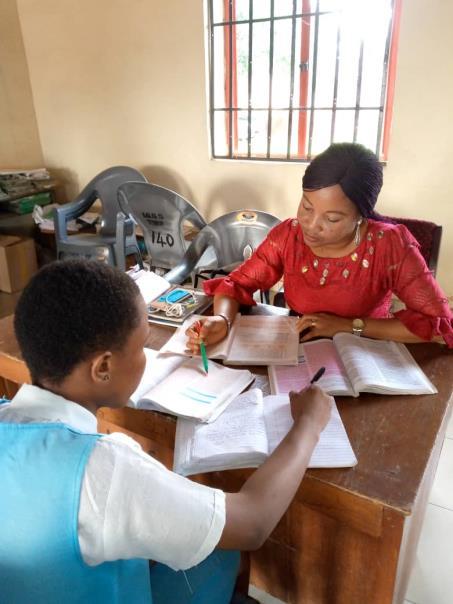


d. They were never given opportunities to talk about their challenges and where they needed help in language learning. This was mainly because my teaching, like that of my colleagues, focused on covering the syllabus and this meant that I could not dedicate time to understanding my students’ needs.
Student responses to the open ended questions were mainly related to what I could do to help them enjoy and engage in activities during my lessons. Responses from students included suggestions such as: ‘I want her to give more examples and illustrations while teaching and jokes, these will go a long way to maintain my attention’; ‘I want her to teach me privately to help me more in English language so that I can improve in class’; ‘By asking question in class that any student who doesn’t understand and is scared to ask question in class should meet her for any explanation in her office’; ‘My teacher should throw more light to those areas like Spoken English, Grammar, Continuous writing, Vocabulary and Comprehension where students have problems’; My teacher should teach us about interesting topics which we can understand in our community’.
Image 1
Trialling one to one support with students.
3
Teachers Researching their Classroom Questions: Reports from Africa
4. What I learned


This study was my first ever attempt to seek to understand my students and it gave me an opportunity to know my students as humans, not just as students. Their responses made me to realized that my students have their likes and dislikes for some topics in English and they would be more focused and engaged in my lessons if I include interesting and familiar topics. This discovery was revealing to me because I had focused on the linguistic aspects of English language recommended in the textbook and had never given thought to the fact that students come to class with different needs, interests and preferences. In fact, I thought I was doing well by just completing the syllabus requirements.
I have also learned from this study that, to help my students focus on their studies and engage with learning, I motivate them not just through familiar topics but also by giving them more examples and illustrations as well as creating space, during break time or free periods, for a one on one interaction with the slow and shy learners. Besides, it is now clear to me that supplementing the current textbook with other English language books and resources would give my students the opportunity to explore different perspectives on a topic.
5. Final reflections
Due to the COVID 19 pandemic and the subsequent lockdown in my country, it was not possible for me to follow up on this study to the end. At the time of writing this report, schools have not fully resumed in my country. However, as soon as classes resume, I plan to share my findings from the questionnaire with my students and generate further discussion so that we can agree on a number of action points. This will also include encouraging them to take on more responsibility for planning, resourcing and sharing in lesson delivery. Subsequently, I hope to continue improving my practice through regularly collecting feedback from my students and incorporating their suggestions into my classroom practice as best as possible and on an ongoing basis.
4
Teachers Researching their Classroom Questions: Reports from Africa
Teaching English in large classes with low resources
 Fatoumata Khoto Senegal fatou.bintou@aiesec.net
Fatoumata Khoto Senegal fatou.bintou@aiesec.net

I am a teacher in Matam: a remote area in South East Senegal. I have been teaching English in high school for five years to students aged between 17 and 23.

1. The problem I faced
In Senegal, teaching resources are limited in remote areas, and teachers face challenges such as having large classes that include a number of students which exceeds 60 per class. Large classes affect the interaction inside the classroom, some students feel intimidated to speak in front of a large number of classmates. I noticed that some students often find it difficult to follow instructions because the teacher cannot manage the class well and noise can prevent students from hearing the teacher’s explanations. As a result, students become unable to understand and keep up with the lessons, and this pushes many of them to drop out of school in remote areas like where I work. Therefore, I decided to do something about it and try to find solutions for this problem.
2. What I did
I decided to explore the issue further by asking teachers who work in large classes for their input and students in these classes for their opinion.
2.1. The questionnaire and interview conducted with teachers aimed at:
• Finding out challenges teachers face in large classes with low resources
• Exploring solutions to overcome these challenges
2.2. The questions in the interview and questionnaire are:
• How many students do you have?
• How often do you see them?
• What kind of materials do you have access to?
• Do you have textbooks?
Teachers Researching their Classroom Questions: Reports
5
from Africa
• Do students have copies of the textbook?
• What kind of facilities do you have to get materials for all your students?
• What kind of technology do you have access to?
• What kind of technology do you feel comfortable using?
• What is the role of materials in supporting language teaching and learning in large classes?

• What are the challenges of teaching large classes with low resources?
• How do you manage to teach in these situations? Do you have strategies or solutions to overcome the problem?
Image 1
Fatoumata's students in class
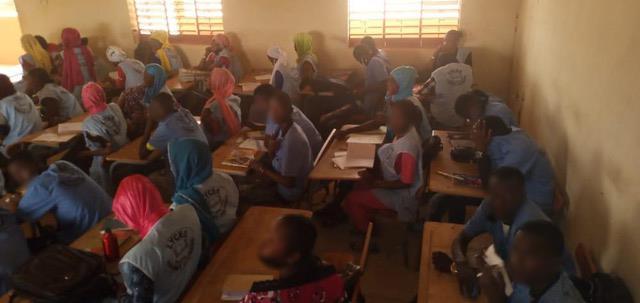
I interviewed six (6) teachers. I also did a survey with students in order to find out students’ opinions on how learning in large classes can be more effective. I included statements students agreed or disagreed with. Students responded to the questionnaire using strongly agree/ agree/disagree/strongly disagree.
2.3. These are the statements I used in the survey given to students :
1. There are too many students in my class.
2. I have access to a textbook every class.
3. I have opportunities to work with a partner.
4. I enjoy working with a partner
5. I don’t have problems with group work
6. I dislike having too many students in my class.
7. I don’t have access to textbooks
8. My teacher doesn’t use technology in class.
9. I would like to use more the internet/ computers, mobile phones in my class.
Teachers Researching their Classroom Questions: Reports from Africa

6
10. We don’t have enough materials. Sometimes, we share them.
3. What I found out
Teachers in large classes with low resources work in difficult conditions. In the interviews I did with teachers, most of them indicated that the class is so large and one of them said that three students sometimes sit on one bench. Teachers indicated that students do not have access to textbooks or if they have them, they are obliged to share the book with other classmates. That is why most of the students said they prefer working in groups or with a partner because they can concentrate and work better this way. Students indicated in the questionnaire that they understand better and are more involved in the tasks when they work in pairs or small groups. As for following instructions, many students indicated that the class is normally noisy and some students who sit at the end of the class do not get a chance to hear the teacher and, consequently they cannot follow instructions. Teachers reported finding it difficult to manage classes of large numbers and this makes students demotivated as they do not get a chance to participate in class activities.
Most of the teachers indicated they have classes that exceed 60 and they suffer from the lack of materials. Sometimes teachers don't have the means to photocopy texts for all the students due to the large number of students and the lack of electricity or power in some areas. In remote areas like mine, large classes are the result of the lack of teachers and lack of rooms. Students that were supposed to be in two or three classes are gathered in one class. To overcome these problems, some teachers divide the classes into two or three groups: a group which comes in the morning and another group which comes in the afternoon for instance. This is a problem for teachers who work extra hours. This also has repercussions on the teaching performance, some classes are more productive than others.
In such a low resource context, some teachers also noticed that students who get to experience an outdoor learning environment tend to be more attentive and focused. Outdoor learning benefits students in many ways: it increases students’ creativity, lifts their moods, and reduces their stress. It helps also the teachers reduce students’ distraction, and decrease behavioral problems. Teachers I interviewed said that when they tried doing an outdoor activity with students, students tend to actively participate and get engaged.
In the student questionnaire, students also indicated that they liked using technology in the class and they wanted to use them, but some teachers seemed to find it a challenge.
4. What I learned

After hearing my colleagues’ and students’ feedback in the questionnaires and interviews, I decided to make some changes to my teaching. I have always thought that teaching is supposed to be done in the classroom, but after listening to a colleague in the interview talking about the importance of using what we have to teach what we want, I found out that teaching can be done anywhere. As a result, one day I wanted to teach my students the different tools used in the kitchen by a cook but I could not bring all these tools in the classroom, my students also did not
Teachers Researching their Classroom Questions: Reports from Africa

7
have the possibility to buy the tools because most of the students live in other villages and consequently are not staying with their parents. It is also time consuming to draw them all on the board. So I decided to find a restaurant near the school where I can get all the tools. I talked to the manager and arranged a visit with my students. They learned the language used to describe all the tools in real life situations. They were really happy and excited to learn in this new environment and I realized that the number of students we have and the teaching materials we get do not really matter, the most important thing is the way we teach.
5. What I would do differently
As for using technology, I am planning to bring my laptop, a microphone, and/or mobile phone to class to ask students to use them in groups to find reading texts online. I believe technology can be a solution for the lack of materials in this context since a teacher can bring a laptop or a cellphone and ask students to find texts to use for class online. This can give them the time to find it and read it before the actual reading class. They can download it on their mobile phones and, while offline, can start finding difficult words before the class. Now for short texts, the teacher can copy the text online and write it on the blackboard and students copy it. These are some strategies used by teachers I have interviewed and I wanted to try them to cope with the lack of materials in this low resource context.
6. Final reflections
I think teaching in large classes with low resources could be viewed in a positive way in the sense that teachers have to bring more creativity and more strategies to make students involved in the learning process. Thus these insights come from what the teachers and students in my study said and what I myself have tried in my class:
• Be creative and genius in order to find adequate materials for their classroom
• Use their environment as a resource, e.g. by experiencing outdoor classes
• Use of a variety of activities that will motivate students
• Divide the class into small groups
• Focus more on activities that students can do in pairs or in groups
• Use instructional materials that do not require electric power (tape records, computer, films etc.) where necessary and available.

• Collaborate with students to design/create materials together.
• Keep students interested and concentrated.
• Encourage students to ask questions /foster students’ curiosity and inquiry.
• Give students time to discuss any question they may have with their classmates
• Include teacher training to better exploit available and possible new resources like the internet, for their use in or outside the classroom.
Teachers Researching their Classroom Questions: Reports from Africa

8
Ernest Kalotoueu Gbeada Côte D’Ivoire gbeadake@gmail.com


I teach in a school called Lycee Moderne Djedji Amondji Pierre Adjame, Abidjan Côte d’Ivoire. This institution combines two levels of secondary education in Cote d’Ivoire first and second cycles with a total of 6,000 students.

The total number of teaching staff in the institution is about 200 including 13 English language teachers. Each English teacher teaches across a number of classes of different levels of students.
I teach four first cycle classes and two second cycle classes. My students range from 12 to 18 years of age and classes consist of 80 to 100 students. English is taught from the first to the seventh year; it is one of the major subjects. We teach our lesson following the new approach called Competency Based Instruction (CBI). According to the Ivorian educational policy document, the introduction of this approach aims at two key goals: updating the school system to face the needs of the world and making Ivorian students, citizens of this global planet, capable of communicating with anybody in the world. To reach these goals, decision makers have designed and mandated a new curriculum and syllabus specific to each subject. What is more, new textbooks have been introduced in schools by the Ministry of National Education and Vocational Training in order to replace the single textbook that was used before. Teachers are encouraged to choose from the different textbooks, the most appropriate for their school context and specific lessons. These books are required to be used along with the syllabus and pre planned schemes of work called ‘educational program’ which offer teaching units and topics.
Teachers Researching their Classroom Questions: Reports
9
from Africa
Facing the challenge of curricular innovation through teachers’ collaboration and students’ motivation
1.
Supporting beginners in developing reading skills



The problem I faced
The problem I faced was how to make the right use of these new textbooks to implement the educational program and reach my teaching and learning goals. In fact, the contents of the new textbooks do not match the contents of the educational program that I have to follow. So, I had to select resources from different books to prepare one lesson. In addition, my students were not motivated in reading because with the new approach, reading time and texts are not the same as before. For example, unlike in the previous lone textbook, vocabulary items in the new textbooks are not often selected from the reading text but out of context and this means that students struggle to understand the text, while at the same time being forced to learn vocabulary that is not even related to the text. I also noticed that I was not alone, many of my colleagues had the same challenge of how to use new textbooks together with the educational program to conduct CBI lessons. I therefore decided to investigate this in order to find a solution to my, and my colleagues’ challenges.
2. What I did
To help me understand how teachers and students were experiencing the new recommended approach to teaching and the textbooks, I conducted a small scale study with teachers and students using Questionnaires to teachers and students, Classrooms observations and Teacher Interviews. The objective of the teacher questionnaire was to find out their perceptions about the new textbooks and how they conducted their CBI lessons using them. The students’ questionnaire sought to
10 Image 1
Teachers Researching their Classroom Questions: Reports from Africa
find out if the textbook contents were interesting enough for students to read them. In total, twenty teachers from my school and neighboring schools and forty two students from my school responded to my questionnaires. Three teachers from my school also agreed to allow me to observe their classes in order to see how they were adapting the textbook content to conduct CBI lessons. This observation was followed by individual interviews with each teacher to enable them further explain their classroom decisions and practices.
3. What I found out

From the questionnaire responses, 11 teachers noted that the textbooks did not allow them to do their CBI lessons efficiently. To justify their positions, they pointed out that the content of two of the three recommended textbooks is so thick that it takes too much time to select what teachers need for their lesson. They also argued that many texts in one of the books did not match the topics on the English language syllabus and educational program provided by the Ministry. Student questionnaires revealed that 28 respondents enjoyed very little of the contents of books, but they considered that the time allocated to English classes did not sufficiently allow them to read and understand texts. Ten students lamented the fact that although the teacher made them buy the books, he never used them. Overall, both teacher and student responses provided evidence that the recommended textbooks were not appropriately used as they posed problems to the majority of teachers and students in conducting their CBI lessons.
Classroom observation of three lessons from different classes revealed that more than 70% of students did not have the recommended textbooks. In one of the classes, the teacher presented a lesson on “Saying Time and Dates” with beginner level students. Typically, a CBI lesson is conducted in three phases: the introductory phase (warm up, review, lead in and learning context), the input phase (vocabulary and language) and the activation phase (practice through activities). She presented all the three phases of the lesson introduction, input and activation without referring to the textbook. In another speaking skills based lesson dealing with ‘Jobs”, the teacher presented vocabulary, language function (or grammar) and ended with a dialogue as the communicative activity, but he could not complete the lesson for lack of time. In the third lesson, the teacher presented a speaking lesson on “New types of energy” In these three lessons, no recommended textbook was used, only worksheets for the input and activation phases although the communicative activities were not done because of time constraints.
During the interviews, teachers of the first cycle explained that they could not use the textbooks because reading them in class is time consuming as the texts are either too long or not adapted to the levels of their students. For the second cycle teachers, they justified their decision not to use the textbooks by the fact that the content of the books did not match the topic they have to cover in each teaching unit. They therefore preferred designing their own teaching materials and adding some content of the textbook when they judged it necessary. As an example of the inadaptability of the books, they pointed out that the books neither provide learning contexts nor problem solving tasks called communicative activities.
Teachers Researching their Classroom Questions: Reports from Africa 11

Classroom observations and teachers’ interviews revealed therefore two things: difficulties in designing CBI lessons with textbook content and a consequent reticence about the use of these textbooks. The failure to complete the different phases (input, activation and communicative activity) of a lesson can be explained by the fact that the teacher could not handle the different steps of a CBI lesson Within the stipulated timeframes and did not have clarity as to whether all lesson stages must be completed within one teaching session or stretched across more than one session. In conclusion, it was clear from interviews that teachers have some knowledge of the CBI approach and make an effort to implement it, but they have problems to adapt materials and other resources they are offered.
4. What I did with my colleagues
From what precedes I concluded that I was not alone in having challenges with the use of the new textbooks to conduct CBI lessons; in fact, all the teachers who participated in this study had the same problems. Following the analysis of the information collected from my research tools, I held a meeting with my colleagues, English teachers in my school, to share my findings. Together we decided to take action. We agreed to organise a workshop where we will watch some volunteers from amongst us conduct micro teaching lessons using one of the textbooks and reflect on their lessons. We also agreed to invite two Pedagogic Advisers to join us and offer useful advice. During the workshop, the two Advisers shared some thoughts about the new approach. We discussed the theoretical basis of CBI and its objectives in language learning and they showed us a video on a model presentation of a CBI lesson. Two of our colleagues then presented their lessons using one of the textbooks; the first teacher presented a reading lesson for 3ème (final year of 1st cycle) and the other one, a speaking skills lesson for Terminal (final Year of 2nd cycle) followed by discussions and reflections on the two micro teaching sessions. From this workshop we learnt the following:
1. The recommended textbooks are “thick” and need being revisited; but they have some good contents that can be well exploited for CBI lessons.


2. Teachers should be able to select the right contents from the proposed resource materials by adapting it to the needs and abilities of their students and not follow them “blindly”.
3. After selecting materials, the teacher has to follow the CBI lesson procedures.
5. What I did on my own
The workshop with colleagues and Advisers helped me design my lessons with a bit more freedom and I tried as much as was possible, to incorporate textbook materials in my lessons. Besides, in order to further address the concerns of my students about reading the textbooks, I started a reading club which met every Wednesday in the afternoons. The 47 students who joined the club were divided into three levels: beginners, intermediate and advanced. Each Level was mentored by a
Teachers Researching their Classroom Questions: Reports from Africa 12
more proficient student from the higher level. The role of the mentor was to help the readers with difficulties. The reading materials we used in the club were of two types: the textbooks used in class and a range of graded readers I received from another project. Each reading session was conducted into two phases. In the first phase individual students read texts silently for comprehension guided by four questions design to help them identify the main ideas in the text. This phase ended with a group discussion in which the mentor supported members in different way including explaining identified difficult vocabulary items. Phase two focused on pronunciation practice where the mentor helped students read parts of the text or specific words aloud. My role in the Club was to ensure that each group was engaged in their activity and to support mentors and groups when needed; I also administered tests to each group after four sessions to help them monitor their own progress.
The reading activity produced two satisfactory results on the students: first, it helped them in class activities as it developed their reading skills. Many teachers including myself, acknowledged that the students who were members of the Reading Club were doing better during the lessons than before and even taking the initiative to support their peers. Second, the graded readers dealing with a large variety of topics reinforced their reading skills, enriched their vocabulary and developed their critical thinking. This really improved classroom interaction during my lessons and helped the students perform well in the final stage of the CBI lesson, the communicative activity. Feedback from two colleagues I invited to observe my class revealed that I had improved my teaching in three main areas, namely that
• I made good use of the textbook by selecting the needed parts of the unit for the lessons.


• I completed the three phases of the lesson successfully and in good time.
• My students were very involved in the lesson by answering questions and interacting with one another.
6. Conclusion
Curricular innovation generally aims at improving school results and addressing learning outcomes. Yet, to reach these objectives, this innovation needs to be conducted with great care as it presents many challenges. I hope I have been able to show in this report how my colleagues and I faced this reality in our classes and together, took initiative to find solutions to the challenge. I am also satisfied that my decision to start a Reading Club which offered a less constraining platform for students to support each other led to improvements in actual classroom student engagement and outcomes.
13
Teachers Researching their Classroom Questions: Reports from Africa
Engaging students in classroom speaking activities:
A case of learners of English in the lower sixth class of Dressmaking in Cameroon
Ita Frinwie Tamenang Ndifon Cameroon ndifri1602@yahoo.com

I am a teacher of English to French speaking learners in the State Bilingual Technical High School in Yaounde, the capital of Cameroon. I have been teaching English language to high school students of this institution for 13 years. My students are aged between 16 and 21. Apart from English Language, I also have a passion for teaching Literature in English and training young teachers based on my experience and seminars attended.
1. The problem I faced


Before engaging in this research, I had always wondered why my students were not motivated enough to speak in my English Class. Despite the fact that many of them spend 7 years learning English at school, they leave high school unable to speak English fluently. This “PIH” class which is the equivalent of a Lower Sixth class that is last but one year in high school has been studying English for 6 years now with different teachers at different levels and are still unable to speak. To motivate them to speak, I designed negotiation and debate activities, thinking that this would motivate all of them to speak. Those activities were not engaging for all of my students, as many of them were still not motivated to participate despite my attempts to make them fun and engaging. I realized that I was trying to solve the problem by thinking about one group of students in my class who liked debates and negotiation activities and not thinking about the other groups who were not interested in this type of activities.
After talking about this problem with my research mentor, Amira Salama, I immediately realised that my assumption that my learners were not motivated was unilaterally made and that my solutions were unilaterally developed and dished out to them in a top bottom approach. Consequently, my lesson planning and my approach to choosing my speaking activities were flawed.
Teachers
14
Researching their Classroom Questions: Reports from Africa
2.
What I did
I was at my wits’ end when I learned of this Africa TESOL IATEFL Research SIG project. After watching the webinars organised by IATEFL ReSIG and after engaging in a reflective conversation with my mentor, I realised that I should take a step back and review my assumptions about my students and my teaching practice. This realisation marked a significant shift in my teaching approach as I realised the need for involving my students in my search for solutions. I learned that their opinion and feedback about my teaching and my activities are very important in solving the problem I assumed was theirs at the beginning.


2.1. Things I did to learn more about the situation
To find out the reasons for my students‘ disengagement and ways to motivate them to speak in class, I made use of the following activities: a colleague’s observation of my teaching, and questionnaires and interviews with my students.
2.2. A colleague’s observation of my class I invited a colleague to observe my class. This was in a ‘Premiere’ class. It was a lesson on “Fashion and Clothes” a vocabulary exercise. By the time the lesson ended, she made the following remarks about my learners’ behaviour:
• They were very attentive in class;
• They made a conscious effort to follow the lesson;
• They understood the lesson but were shy to stand up and answer questions;
• Those who were anxious to answer questions did not know how to express themselves or lacked the appropriate vocabulary with which to express themselves;
• Those who were bold and courageous blended English with French in order to communicate;
• They were quiet but distracted during grammar reinforcement with one of them secretly doing an assignment under the table for the next teacher.
These observations were very important and relevant for the purpose of this research which aims to find out why some of my students do not speak in class and what would motivate them to do so.
2.3.
Questionnaires and interviews to learners
First, I administered a questionnaire to my students which sought to find out if they like speaking English in class; if not, what discourages them from speaking; identifying which classroom activity excites them to speak; and stating whether the type of activity carried out in class or its length affects their performance. After the questionnaire, I interviewed some of my students individually to confirm my understanding of their questionnaire reponses.
Teachers Researching their Classroom Questions: Reports from Africa
15
From the students‘ responses from the questionnaire and the interviews, a number of key ideas came up which gave me insights into how my learners learn or get discouraged by some of the activities carried out in class. For example, some of them said that they do not like to speak in class because they are afraid to make mistakes and be mocked by their classmates. Some said that they do not speak because they understand neither the topic nor the vocabulary used at times. Others said that their inability to pronounce words correctly deters them from speaking. They also went ahead to identify different classroom activities that excite and move them to speak. These include listening to news bulletins and reporting on them in class, highlighting and drilling on workshop vocabulary and vocabulary from different fields of life, seeking their opinions on issues raised in class, performing sketches, role playing or being called up to answer questions. While some found the time allocated for English sufficient, some thought that it was not long enough to allow room for practice. A few of them thought that the language class time was rather long and needed to be reduced to cover fewer items to be taught for easy remembrance. On a more positive note, some though very few said that they enjoyed all the activities carried out in class.
3. What I found out
From the above responses, I found out that the assumptions I had made about my learners that they do not like English, are not interested in speaking it in class and make no effort to follow up what is done in class in order to be part of it were all false. These assumptions were no longer supported by their responses. I rather learnt that many of them want to speak in my English class but are frustrated by the methods used and the activities carried out and that if they are made to overcome shyness when mocked by their mates they would come out and speak. In a nutshell, I learned that I needed to assist them to speak by stepping up pronunciation activities, conducting different vocabulary drills, diversifying role play activities, repeating lessons for better understanding, engaging the learners in listening to news bulletins and reporting on them in class, amongst others mentioned. The bottom line is that I learned that it is very important to make my learners an integral part of the conception and dispensation of my lessons. When this is done, everyone ends up being satisfied as their opinions are taken into consideration and their desires met at one moment or another.
4. What I learned

From the foregoing, a number of things changed in my manner of preparing and delivering my lessons, especially speaking lessons. With this in mind, my first lesson after the research witnessed a lot of positive changes as would be seen below. To begin with, together with the learners, we came up with new rules about classroom management that would support speaking. They proposed and together we adopted as a class that heavy sanctions should be imposed on anybody who mocks another person for making an effort to speak in English in class. The general opinion was rather to encourage and help anyone making a positive effort to speak in English. In other words, my methods changed at the level of planning lessons as I would often
Teachers Researching their Classroom Questions: Reports from Africa

16
get from them, through dialogue and brainstorming suggestions. the things they are interested in, with a view to using them in building up the lessons. At the level of lesson delivery I made great use of the technique of diversifying activities that respond to the different ways they said they prefer learning. It is true that all the techniques could not be used in one lesson but I tried as much as possible to diversify them.
4.1. Sample lesson that confirmed change

In a speaking lesson where the focus was to develop the vocabulary of sewing a dress, there was clear evidence of positive change in the dynamics of teaching/learning in my class. I expected my learners at the end of this lesson to be able to use appropriate sewing vocabulary to talk about the process of sewing a dress. During the lesson the new method was applied where I gave room for the learners to contribute in shaping the way learning was to be affected. Immediately, a number of them asked that I should first help by drilling them in how to pronounce some of the words they knew but could not pronounce properly. So, I stopped and did a pronunciation drill for words that they came up with. It empowered and encouraged them to confidently move ahead. Some called for diversification of activities and went ahead to suggest that we actually play out the process using vocabulary needed for tracing patterns and cutting out designs. This we did, as can be seen from pictures 1 4. At this point the excited learners started to ask for help from their peers, team members or the teacher each time they were stuck. For example, the student in picture 4 stopped me to ask for the appropriate verb used in describing what she was doing. At the end of the exercise a number of them were interested to learn the new vocabulary that came up in the different groups. I encouraged them to suggest how they would want that done. The majority of them voted for a vocabulary game and we went ahead and excitedly did this in pairs. It simply involved two students taking turns in playing the game; student A would pick up an item and ask student B to say what it was. I was so happy and satisfied to note that they were subconsciously learning the structure of “wh” questions. They mastered the structure “what is this?”. Some even came up with “How do you call this?”. They realised that speaking was not as difficult as they had thought. The repeated use of the same structure consolidated learning. Where their peers would not come up with the right word they all turned to me for new knowledge or sometimes just for reinforcement or confirmation of what they already knew. The game was made more exciting when they were given room to go and write out these words and phrases on the board.
The new element in this process therefore, is the fact that the learners now take more responsibility for their learning, and express their opinions freely. They learn from their peers and depend on the teacher more as a guide, coach or source of new material and reinforcement. At the end of the lesson they were happy and satisfied to see that they had developed the material on the board and retained it in their minds before copying it in their books. They went home with new vocabulary such as ‘chalk’, ‘cloth’, ‘table’, ‘needle’, ‘sewing machine’, ‘a pair of scissors’, ‘thread’, ‘tape’ and phrases such as ‘take the measurement’, ‘trace a pattern’, ‘cut the design’,
Teachers Researching their Classroom Questions: Reports from Africa

17
‘sew’, ‘hem the edges’, ‘iron the dress’ and ‘display or exhibit it’. There was an interactive atmosphere in class contrary to my previous method where they would mostly listen to me and I could not decipher whether they actually learned by listening to me or not. I was satisfied to note that when they got stuck and asked me to supply the needed vocabulary they did not only sail through but easily retained the new vocabulary. They now confidently use the right vocabulary to explain the process of sewing a dress. What this means is that they can explain the process to another person and can cause the person to replicate the process. Vocabulary is no longer an obstacle in speaking and explaining the process of sewing.





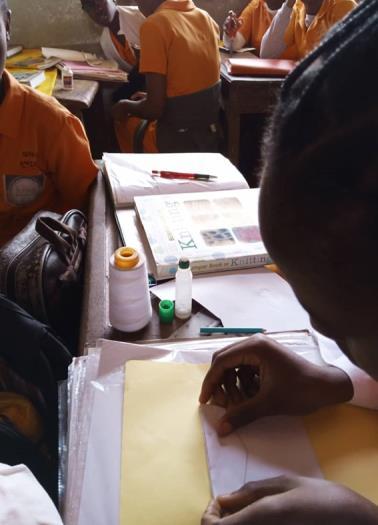
18
Teachers Researching their Classroom Questions: Reports from Africa
4.2. My colleague’s observation after my intervention
The same colleague, who observed the class at the beginning, observed again after I had implemented changes based on her initial observations, and had this to say: this phase of the lesson was very impressive. She remarked that:
• The learners became more daring,
• Peer learning was on a positive rise ,
• There was a high spirit of cooperation between learners and the teacher,
• Learners made a conscious effort to pronounce words correctly,

• Those who were always shy to open their mouths to speak made a visible effort to speak in class.
5. Final reflections
Through a subtle discussion with the learners, I am satisfied that they are happy and satisfied with the new method and with their performance and are determined to keep improving. I am equally satisfied with the new spirit of my learners in expressing and defending their opinions while seeking consensus through the teacher’s opinion. The sound drills in class and keen listening to fine speakers over the media and out of the classroom and reporting or replicating in class has also greatly improved their pronunciation. This is also reflected in the improvement in their grades and the conscious effort made to speak in English with one another in and outside the classroom.
Teachers Researching their Classroom Questions: Reports from Africa

19
Using other languages in teaching English

 Moussa Ngom Senegal moiseibndby@gmail.com
Moussa Ngom Senegal moiseibndby@gmail.com

I teach in a public secondary school in Senegal. Like many schools in the country, mine is located in a rural area and has about 300 students. The number is not big for a public school, but the problem is the class size; the average in my school is around 45 students per class. They sit in pairs and sometimes in threes. Their ages are between 12 (in the first year) and 17 (in the fourth year). There are 18 teachers in my school teaching across nine subjects in total including four of whom are English teachers. All teachers are Senegalese nationals from different parts of the country. The first year and second year students have five hours of English per week, while third and fourth year students have three hours of English each week. Students in the fourth year sit for a national examination which is called Brevet de Fin d’Etude Moyen (BFEM). During this exam, they are assessed in writing and in speaking. The students in my school are from multilingual backgrounds, and generally speak French (the official language in Senegal) in addition to local languages such as ‘Wolof’, ‘Sérère’, ‘Puular’ and others equally spoken by all teachers, including the four teachers of English.
1. The problem I faced
My English teaching colleagues and I meet regularly in a pedagogical cell to discuss our teaching methods and approaches. In the Senegalese educational system, these pedagogical cells consist of teachers of the same discipline. So, they meet locally, in their different schools each two weeks, and monthly with other English teachers from schools within a specific zone to discuss issues that concern the common discipline. A question which regularly arises in these discussions concerns the role of local languages in education more broadly and in English language education. We often debate the use of these local languages in English language classes, whether and how they should be used. Some teachers feel that English should be the only medium of communication in our classrooms; others feel that English only classes negatively impact on the learners’ behaviour and that there is a space for using other languages which students understand more readily in order to support their development of English language competency and proficiency.
Teachers
20
Researching their Classroom Questions: Reports from Africa
As a teacher with 12 years of experience, the question of whether or not to make use of students’ multilingual resources in the classroom is an important dilemma that I need to address in order to be more effective for my students. On the one hand, some teachers say that it is not right to use other languages in an English course because doing so would not help learners become familiar with English. On the other hand, there are colleagues who argue that other languages can effectively help teachers be more efficient in facilitating English language learning. They also hold that the use of those languages should only occur in certain difficult situations but not to deliver the entire course. I do understand the teachers who say that English should be the only medium of communication in our English language classrooms. Their concern is to ‘hook’ learners to the language they would be using in their advanced studies. However, this does not feel like the whole picture for me. Therefore, my aim, in debating with other colleagues, has always been to explore the issue, to talk to both bilingual and multilingual teachers about their experience and classroom practice. I wanted to find out more about what those situations are and how teachers can use the local languages to the best effect.

2. What I did
To explore the problem of using other languages in an English classroom, I designed a questionnaire which included close and open ended questions. The questions were related to the use of other languages, its impact in the teaching learning process, the level of satisfaction of teachers who use them, and so on. Then I distributed the questionnaire to 17 English language teachers, colleagues in different schools and regions of the country. Among them, only eight sent back their responses. I also interviewed seven students chosen at random in four different schools. I did so in order to gather a range of opinions and ideas from students. The interviews included students from the second year, from the third year and from the
Teachers Researching their Classroom Questions: Reports from Africa

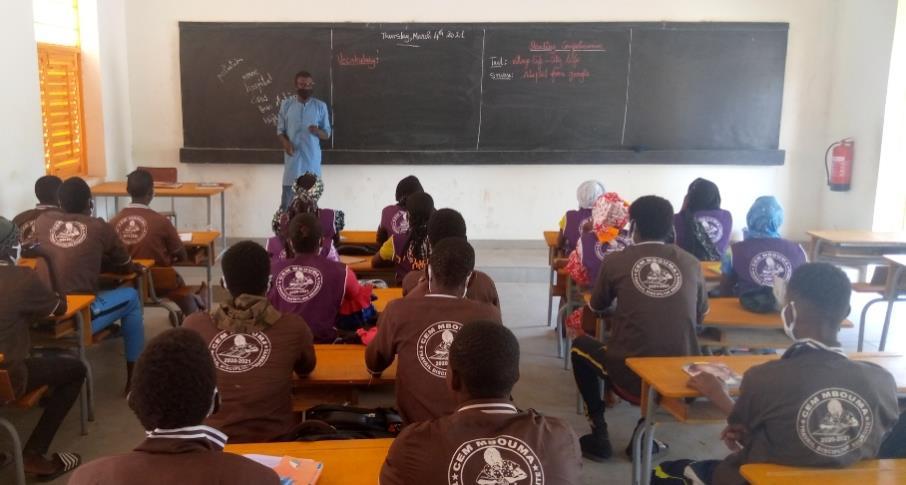
21
Image 1
Vocabulary lesson with fourth form students
fourth year. My aim, in the interviews, was to find out what the students, themselves, thought about the use of other languages in the English language classroom in order to compare their responses to those of teachers.
3. What I found out
I found that all the colleagues who answered my questionnaire have used other languages in their English language classrooms. When need be, they all use French just to address some issues related to a given point. The most used languages were French and Wolof, although some of the teachers indicated that they used a few other local languages which they could speak. One possible reason why these two languages were the most commonly used in the English class is that French is not only the official language of Senegal, but it is also the language of education right from primary school. Wolof on its part, is a local language which is widely used as a lingua franca by speakers of other local languages in Senegal. As a result, these two languages seem to be the most accessible to students and therefore are useful for supporting students’ development of academic knowledge in all other subjects including English language. Teacher responses showed that although English was the primary medium of communication in English lessons, teachers used French and/or Wolof mainly for the following reasons:
• explain or translate vocabulary,
• give instructions,
• explain language rules, e.g grammar,
• develop rapport and a good classroom atmosphere,
• correct spoken errors,
• give feedback on written work,
• maintain discipline,
• explain when meanings in English are unclear,
• help individual students with low English language abilities

Interviews conducted with students revealed information related to teachers’ use of other languages in class and how this influenced student learning. Student responses revealed, for example that:
• their teachers used other languages in some situations
• their teachers use French as an alternative medium to clarify instructions, to explain the meanings of difficult words, to reinforce or to help students whose understanding was slower than the rest of the class.
• the use of French, wolof or any other familiar language was positive and beneficial for their learning, it helped them master rules more easily, understand the teacher’s explanations quicker, feel free to participate and be more active in class.
• students could not properly follow the teacher when he/she used exclusively English.
Teachers Researching their Classroom Questions: Reports from Africa 22

4.
What I learned
I learned from the teachers’ and students’ responses that it is sometimes good to lead students from what they know in their familiar language to get new knowledge in a foreign language such as English. Their responses revealed to me that the use of other languages can help ESL or EFL teachers and students cover language content faster and efficiently. Without any ambiguity, teachers and learners as well recognize the importance of these languages in handling issues related to English learning. I also learned that students are more motivated and more confident when the teacher uses French, Wolof or any other familiar language to explain complex rules of English grammar and syntax or if teachers allowed students to translate key vocabulary in a text.
5. What I did differently
As a result of what I found out above, I decided to change the way I approached English language teaching with my first and second year students. I started by explaining what I expected from them. We defined classroom rules around the use of French or Wolof. These included:
• “not using a French or Wolof all the time” because the students need to know when they are allowed to use other languages in order to avoid getting into bad habits or losing too many opportunities for using English in class.

• “asking for permission before using another language” so that I can assess the relevance of using it to their overall understanding of the language lesson. They were also required to ask for permission by using sentences such as “Sir, can I use French/Wolof to clarify/explain…? / Sir, can I ask my question in French/Wolof?”. I insisted on the use of full sentences in English when asking for the teacher’s permission. Doing so may make them somehow familiar with short sentences, and also with the structure of interrogative sentences. I saw this as a kind of incidental learning opportunity but for the students it was fun because making a full and correct sentence in English made them feel happy and confident.
In addition to these more formal requirements agreed with students, I planned and delivered my lessons in a way that created space for local languages to support comprehension and facilitated learning. For example, in a vocabulary lesson I did with my second year students, I allowed them to apply the established norms during the three steps (pre, while and post reading). They interacted with me easily and I still think about what one of them said: “Monsieur, pouvons-nous écrire les mots en anglais et les définitions en français?” (Meaning: “Sir, can we write in our copybooks the vocab items in English and their meanings in French?”. His question made him more confident in using another language in my English language classes. I noticed a drastic increase in student participation. The class was noisier during group work activities and even weak students participated. The majority of the class was
Teachers Researching their Classroom Questions: Reports from Africa

23
involved, and each course presented was an opportunity during which they discovered new things because they felt like they were no longer in a situation where English only rules and norms reduce their freedom to express their ideas. As far as I am concerned, I was satisfied because it was easier for me to reach my gaols in terms of communicative and relevant content. Compared to what I used to do, the possibility of using another language to allow a better understanding to learners is very successful. I find my classes more alive and more interactive. That is why I resolutely decide to do the same thing in my other classes.
6. Final reflections
This small scale research shows that in a multilingual context like Senegal where English is a foreign language, teachers can benefit from using other local familiar languages in the English classroom. One of the objectives of English language teaching is to enable students to feel free and comfortable to express their ideas and when they are still struggling to master the language, it is important that teachers encourage them to draw from their existing linguistic resources to express their ideas. Also, according to what I noticed when allowing the use of other languages in my class, the learners like the use of other languages, especially French, because it permits them to have an easy understanding of what the teacher is saying. They are also more confident working in pairs or groups. I would therefore argue that the use of students’ familiar languages in the English classroom should be taken into consideration when designing lessons because it helps students in an EFL context such as Senegal to be more interested, more confident and have a quicker and fuller understanding of the target language. Conducting this exploratory research has made me more efficient for my students and more aware of what works in my classroom. Even though I will try to improve my teaching by exploring other approaches, I will continue using this approach in my classes.
Teachers Researching their Classroom Questions: Reports from Africa


24
Investigating student teachers’ understanding of academic writing
Rethabile Mawela South Africa joymawela@yahoo.com
I am a lecturer at a rural university in South Africa. I teach B.ED English Language (in service) teachers who have been in the classroom for many years without a B.ED degree. I have been doing this for eight years and have a passion for developing teachers.



1. The problem I faced
The department in which I teach offers a B.Ed English Language Teaching degree to in service teachers of English Second Language. These are under qualified teachers who have been teaching for a while and are given the opportunity to study part time. I teach “Introduction to Research” to a group of 30 students in the third year B.Ed in English Language Teaching. The module assessment requires my students to conduct a mini research project in their classes and to compile and present a research report both orally and in written form. The oral presentation and written report account for 20% and 80% of their final score respectively. My experience has been that the students enjoy conducting the mini research project and they give good oral presentations on their research. This is, however, not the case with their written research reports where their performance is always low because of their poor writing skills, making them underperform in the module. My observation is not limited to my module alone; in fact, other colleagues have expressed concern over the years about the poor writing skills of many university students citing essay type assignments and tests as evidence of students’ academic writing challenge. These concerns led me to conduct an investigation in order to identify and understand the real problems students face with academic writing.
2. What I did and what I found out
I decided to explore students’ understandings of academic writing in order to measure the extent to which they would need to be supported. This would also help me find out the reasons for their poor performance in the writing of research reports. I conducted focus group discussions with the students and I found that they have limited understanding of what academic writing is.
Teachers Researching their Classroom Questions: Reports
25
from Africa
Firstly, the students were asked to work in groups of three. I asked the groups to discuss and write down what academic writing is or what it entails (see image 1). The groups came up with several explanations of what academic writing means to them. I collected their descriptions and grouped them according to their similarities. Three themes emerged from these responses. 34% of the class said that the content of academic writing is research based. This means that the information written is researched and scholars are cited. 55% of the class said that academic writing entails different genres written according to a specific format. The genres referred to are research reports, essays, novels, and poetry. 10% of the class said that academic writing is divided into four parts. The four parts are poetry, drama, novel and grammar.
Image 1
Content is research based (34% of the class)
Academic writing is divided into four parts (10% of the class)

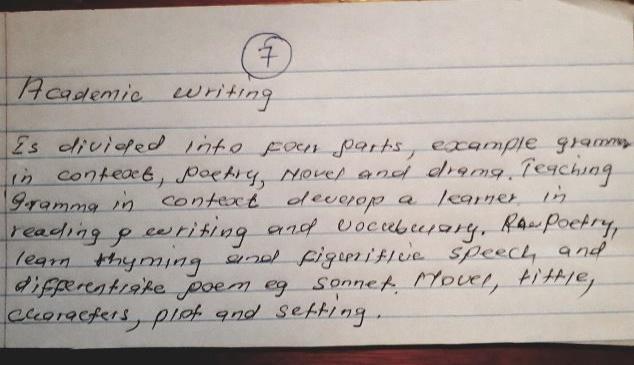
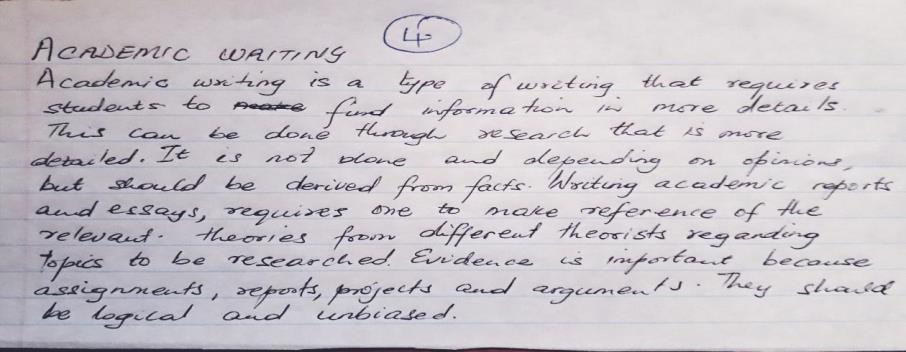
Teachers Researching their Classroom Questions: Reports from Africa

26
This step was useful because it revealed the knowledge gap that existed in my class. Ten percent of the class said that academic writing is divided into poetry, drama, novel and grammar; this is not what academic writing is. These are literary genres taught at school and in that context they are assessed as formal writing. This is why the students understood the genres as academic writing. In addition, there seems to be a misconception among students about the meaning of text types, genres and what they call “parts”. These misconceptions helped me realize the extent to which I needed to support my students.
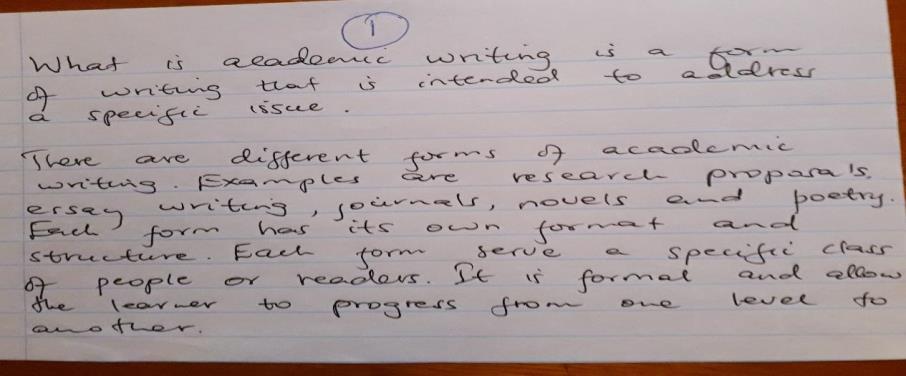
At this point it became necessary for me to define academic writing. Academic writing is defined differently by different sources. One broad definition of academic writing is that it is non fiction formal writing style used at institutions of higher learning. It is what students are expected to produce for classes and what academics use to write scholarly material. There are many types of academic writing which include research reports, abstracts, conference papers, essays, and book reports.
After defining academic writing I conducted a focus group discussion with the students. The purpose of this discussion was for the class to engage with the different views and come up with a possible shared view of academic writing and for me to guide the class to get a clear understanding of what academic writing is. Some of the points discussed were the misconceptions identified during the first phase of the research when the students defined academic writing such as genre, text type and parts. I explained that novels, drama, short stories and poetry are literary genres identified by form, content and style. These literary genres are written according to certain formats, but they do not constitute academic writing.

Furthermore, during subsequent lessons I taught types of academic writing which are abstract, academic journal article, book report, essay, conference paper, dissertation, research proposal, research paper and research report, to mention just a few. Academic writing pieces are characterized by a formal tone, precise language, usually written in the third person; it must be organized in linear form and source citations. I made it clear that the structure of academic writing has three sections or parts, called introduction, body and conclusion.

27
Teachers Researching their Classroom Questions: Reports from Africa
Academic writing entails different genres written according to specific format (55% of the class)
For the purposes of the module I focused on how to write a research report. The parts of a research report include an abstract, introduction, implemented methods, results based on analysis, discussion and conclusion. These were explained in full and modeled later when the students began to write their research reports. These robust discussions resulted in the agreement that academic writing entails different genres written according to specific formats, text types, or functions.
3. What I learned
When the class had agreed on a common understanding of what academic writing is, the students were asked to suggest what teaching approaches, practices and activities I could use to teach them academic writing. This discussion included ideas such as whether or not there should be a separate module specifically for academic writing. A number of ideas were put together for me to consider since I was about to focus on developing their academic writing practices.
This focus group discussion took place on zoom, and the three major points that were raised were:
a. They suggested that I must teach them academic writing. The department in which I work does not teach academic writing. There is no designated module or lecturer for academic writing. It has over the years been expected that students must come equipped with academic writing skills.
b. They suggested that I model academic writing pieces so that they can have a model to follow. The students indicated that, contrary to my expectations, they are not equipped with the skills to write academic pieces.
c. They further suggested that they be given a chance to submit drafts of the research report before the final submission date. The practice had always been that they write the report and submit it at the end of the year since there was no support provided during the year for this module.


From this focus group discussion, I learnt that I need to model academic writing and have the students write drafts before they write the final piece of writing which will be submitted for formal assessment. I also learnt that I must give detailed feedback on the drafts submitted to me in order for the students to know exactly how to improve their writing.
4. What I did differently
From March 2020 the country went into lockdown because of Coronavirus 19. This forced institutions of higher learning to shift to online classes. I conducted classes via zoom and via WhatsApp. This had not been anticipated, but it was the best way to deal with the situation. So, the interviews conducted at the beginning of this research project were face to face interviews. However, the focus group discussion as well as the subsequent lessons took place on zoom.
Teachers Researching their Classroom Questions: Reports from Africa 28
The first thing that I did differently was to change my attitude towards my students. I no longer blamed them for poor academic writing skills; I took responsibility for their development and treated them as partners in the teaching learning arena.

The second thing I did differently was to establish writing groups. I would provide a sample (see image 3) of the piece of writing we were to work on; then I would lead the class in analyzing and scrutinizing the sample by looking at what should be included and what should be excluded. After these whole class discussions, I placed the students in groups for them to discuss and write outlines or mind maps (see image 2). They were to draft mind maps of their research reports; a group would draft a mind map of one of the group members. After receiving feedback they would assist one another to draft individual mind maps. The groups would then write drafts of their research reports and submit them for feedback and then when all the students had been adequately supported I let them write and submit their individual pieces of writing. All these writing activities centered on the students’ research reports since that was the ultimate goal.

Image 2
Group work mind map for school background
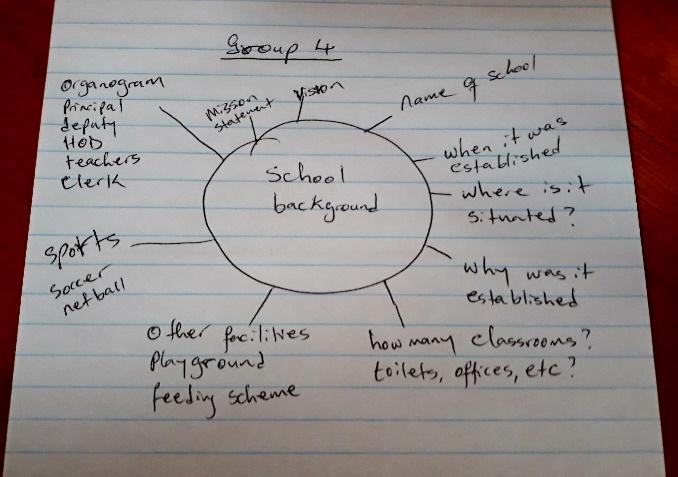
29
Teachers Researching their Classroom Questions: Reports from Africa
Image 4

Another thing I tried to do differently was that when the students wrote their individual research reports in preparation for the end of the year submission, I asked them to submit their reports for detailed feedback first (see image 4). Each student received feedback on the draft after which they worked on the corrections and submitted the final copy for summative assessment.
5. Final reflections
The purpose of this exploratory research was for me to understand the reasons for my students’ poor writing skills and to find ways of helping them improve their writing skills. Focus group discussions revealed that some students had very little understanding of academic writing. This emerged as a major cause for their poor academic writing skills.
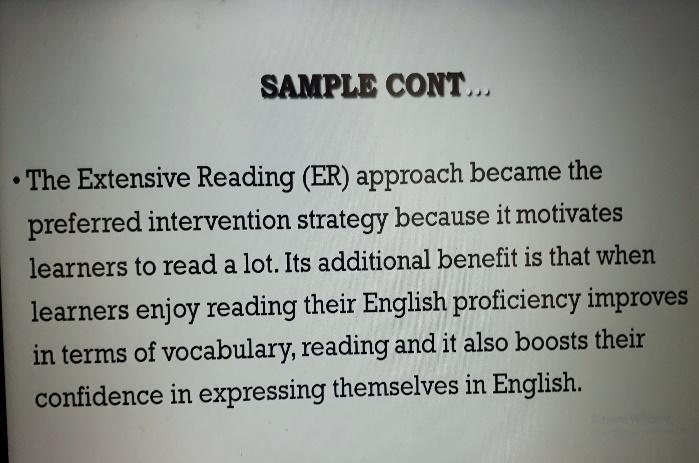

The second purpose of the research was to give the students a voice when it comes to the teaching approach that should be used to teach them academic writing. I learnt that when given a voice, students are able to contribute constructively to the teaching learning agenda. Involving them in the decisions of how I could help them benefited them and enriched my development as a teacher as well.
The teaching approach of modelling creative writing pieces, allowing the students to write in groups and providing formative assessment helped to improve their academic writing skills. The final drafts of the research report were submitted at the end of the year and there was remarkable improvement. It can be confirmed that involving students as active participants in the teaching learning space and the
30 Image 3
Teachers Researching their Classroom Questions: Reports from Africa
Sample of academic writing piece
willingness for the teacher to try new ways of teaching has a positive effect on the outcomes of teaching and learning. I have become a better teacher and my students’ academic writing skills have improved.
Teachers Researching their Classroom Questions: Reports from Africa


31
The use of Pidgin English by senior secondary school students in Bauchi State in Nigeria
 Ruth OnyecheOgboji Nigeria ruthogbojij@gmail.com
Ruth OnyecheOgboji Nigeria ruthogbojij@gmail.com


I am a teacher in Kafin Madaki, a local government in Bauchi State, Nigeria. I have been teaching for 11 years. My students are aged between 16 and 19. I’m passionate about teaching English and I’m interested in developing my students’ language skills, especially speaking skills.
1. The problem I faced
I started to get worried when I noticed that students in my class use Pidgin English in small group activities. They also use it in writing as I started to see words such as DEM for THEM, DEY for THE, and so on, suggestive of the fact that many students have become unaware of the distinctions between the Standard English language and the Pidgin English. I set out to discover why there was so much preference for Pidgin English amongst senior secondary school students.
2. What I did
To understand my students’ preference for the use of pidgin English, I conducted a study amongst randomly selected senior secondary school students in Bauchi State, Nigeria. My research used a questionnaire conducted with a total of 115 students in the senior secondary who were selected from 10 public secondary schools within the state in a two stage process. The first stage involved a random selection of 10 schools. Then, I purposefully selected 11 students from these 10 schools. This selection was spread across the 3 classes in Senior Secondary based on a pre established criterion which is, being fond of frequent usage of Pidgin English. Classmates attested to the ease with which they switched to pidgin in the middle of formal conversations.
The questionnaire was structured to sufficiently account for the key objective of the study which is reasons for the preference for pidgin English with questions like:
Teachers
their Classroom Questions: Reports
32
Researching
from Africa
• Why do students prefer to speak pidgin English?


• What measures can be used to minimize students’ preference for pidgin English?
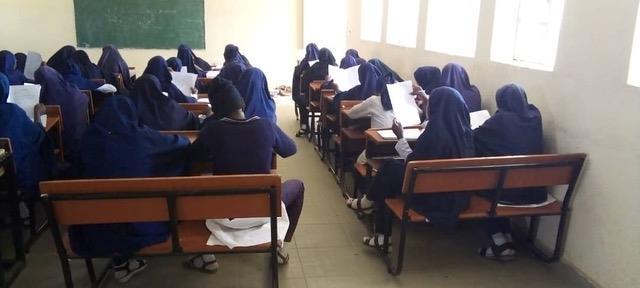
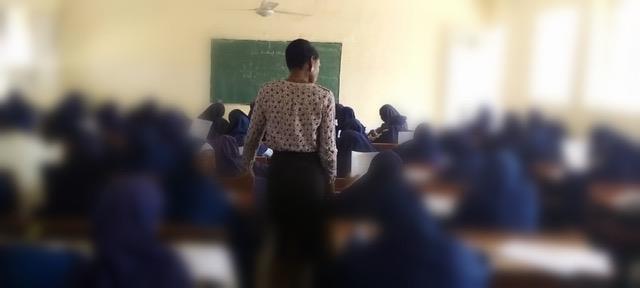
Students had to indicate next to each statement where they strongly agree, agree, undecided, disagree or strongly disagree. In order not to compromise the reliability of the data, the questionnaire was subjected to thorough scrutiny and thereafter pretested. Furthermore, I interviewed forty (40) of the respondents orally on a face to face basis and then proceeded with the analysis of data analysis.
Image 1
Image 2
33
Teachers Researching their Classroom Questions: Reports from Africa
Students are doing classroom activities Nigeria
Ruth’s students engaged in class
3. What I learned
Table 1.0. Reasons for the preference for Pidgin English amongst Senior Secondary Students
RQ 1: Why do students prefer to speak pidgin English?
Frequency (%)
STATEMENTS Strongly Agree Agree Undecided Disagree Strongly Disagree Mean Pidgin English makes for clearer expression of opinion.
36(31.3) 51 (44.3) 3 (2.61) 13 (11.3) 12 (10.4) 3.75 7 (6.09) 27(23.48) 6(5.22) 3.58 3(2.61) 10(8.70) 4.50 8(6.96) 17(14.78) 4(3.48) 17(14.7
The use of good English obscures the humour in informal conversations.

31 (26.76) 48 (38.26) 7 (6.09) 27(23.48) 6(5.22) 3.58
Pidgin English is a confidence booster for not so fluent users of Standard English.
57(49.57) 42(36.52) 3(2.61) 10(8.70) 3(2.61) 4.50
Students who speak good English unreservedly are viewed as proud and arrogant
57(49.57) 32(27.83) 8(6.96) 17(14.78) 9(7.83) 3.83 54(41.74) 9(7.83) 3.83
Students with pidgin English family background may have a hard time being consistent in the use of standard English language.
49(42.61) 54(41.74) 4(3.48) 17(14.7 9(7.83) 3.83
Teachers Researching their Classroom Questions: Reports from Africa

34
The table above and the following discussion present the results of my questionnaire.
Table 1.0 shows that an overwhelming majority of students believe that Pidgin English is a confidence booster especially when the speaker is not so fluent, while 75.06% of students feel it makes for a clearer expression of opinion. More interestingly, I discovered that 70.44% of students held an erroneous notion that students who constantly speak Standard English are viewed as proud and arrogant and this can cause peer pressure. This sufficiently explains why students switch between Standard and Pidgin English especially when they converse with peers. On another note, students with a Pidgin English family background may have a hard time being consistent in the use of Standard English.
Table 2.0.Measures to minimize students’ preference for pidgin English
RQ 2: What measures can be used to minimize students’ preferences for pidgin English?
Frequency (%)
STATEMENTS Strongly Agree Agree Undecided Disagree Strongly Disagree Mean Students who use standard English in school should be periodically commended and rewarded.

Disciplinary measures will serve as deterrent and provide longer lasting checks.
Students should be regularly cautioned against the use of pidgin English especially in the classroom
47(40.87) 22(19.13) 7(6.09) 25(21.74) 14(12.17) 3.55
9(7.83) 13(11.3) 28(24.35) 30(26.09) 35(30.43) 3.22
49(42.61) 37(32.17) 7(6.09) 13(11.3) 9(7.83) 3.90
From the table above, it can be understood that the majority of respondents frowned at the use of disciplinary measures as a means to effective learning of Standard English. It thus goes a long way to attest to the fact that such measures may be counterproductive. I learned a very important lesson from here that a more appropriate replacement for disciplinary measures especially when it has to do with the teaching and learning of standard English is a reward system that can motivate students to use Standard English in my class.
Teachers Researching their Classroom Questions: Reports from Africa 35

4. What I did differently
I started to consider applying a reward system, not a punishment system, to encourage my students to use Standard English. In the classes before the final examinations, I emphasized that we were going to look beyond the correct answers and that the evaluation would focus on pidgin English induced effects such as spelling errors, omission errors, wrong pronunciation, and wrong word use. Furthermore, I announced that the students with the best performance in each class would have the English Language Texts for his/her next class delivered free of charge. Never in the history of my stay in the school have I seen students perform brilliantly in Standard English such as I saw it in the last examination. To say the least, I was motivated to do more.
Another change I made in my teaching was that of creating “the English expression groups” in my class. In these groups, students worked together to do a task. I gave them the chance to interact and negotiate ideas using pidgin English. It was important for me that they understand the task before hearing their output. In the groups, students helped each other and I could hear a mix of pidgin and standard English. Students were encouraged to speak Standard English, but were never threatened to do so. I realized this motivates my students to get involved and encourages the shy students to engage in class activities.
5. Final reflections
After conducting my research, I realized that my students use pidgin English in small groups and in class activities to fill in gaps in their knowledge of English, but when asked to speak Standard English in their final exam, many of them did very well. Using pidgin English in their groups did not affect their performance in the test as I previously thought. I learned that it is important to give students the room to learn the language in a less intimidating context, try to fill in the gaps in knowledge they have in the target language and at the same time encourage students to use the target language through using a reward system. Teachers also need to introduce a cultural element of English when teaching it to also normalize the speaking of English in such context so other students do not regard students who only use standard English as arrogant and proud, as indicated in the results of my research. The teacher who speaks English fluently can be the role model in this situation by demonstrating their own experience in learning English and relating to students’ background so they do not regard someone who does the same as arrogant. In my future lessons, I also intend to caution the students against the use of pidgin English and give them a chance for self correction and ample practice on the target language so they get enough input before production.

Doing this research has helped me realize the reasons for my students’ use of pidgin English and reflect on my classroom practices to improve them for better learning.

Teachers Researching their Classroom Questions: Reports from Africa 36
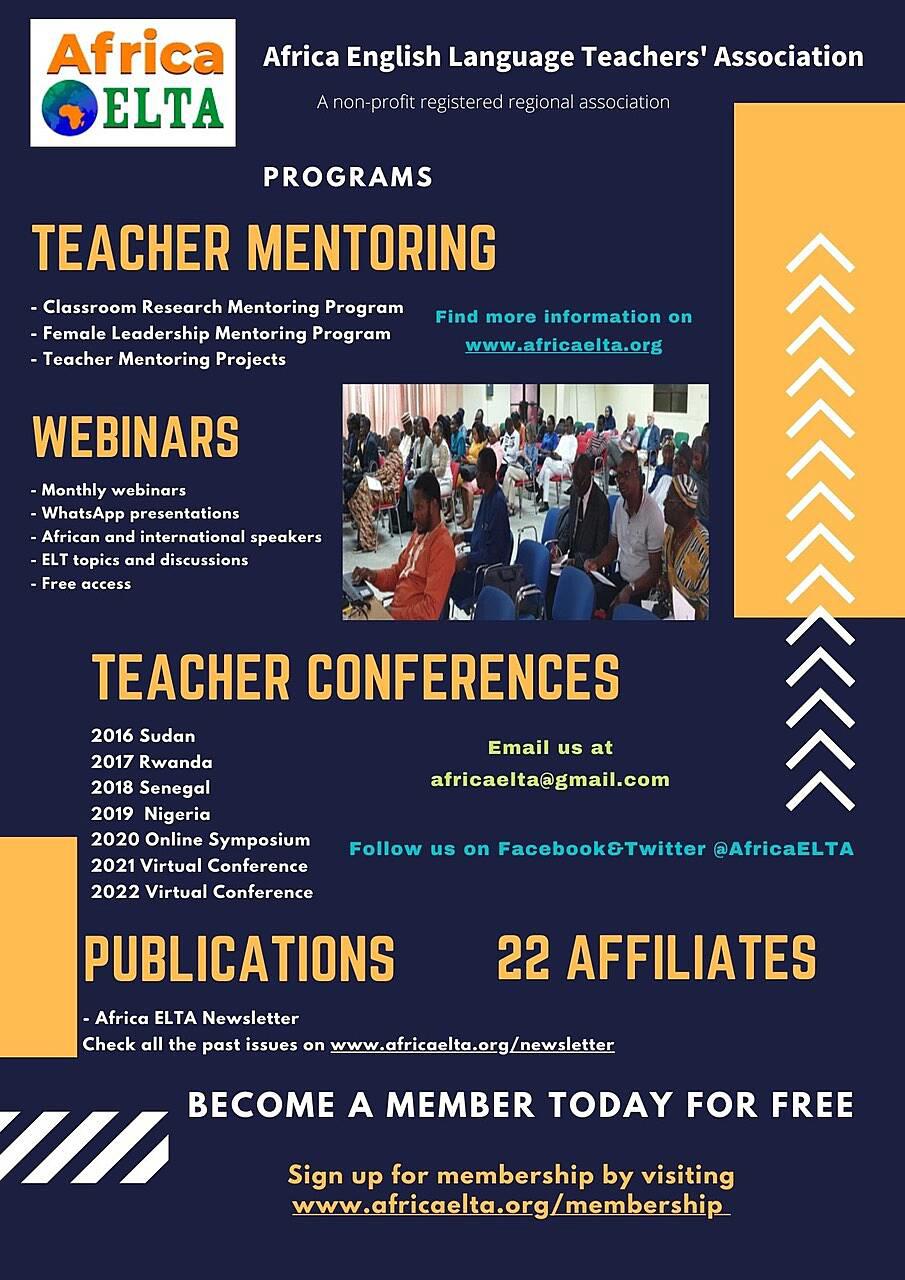
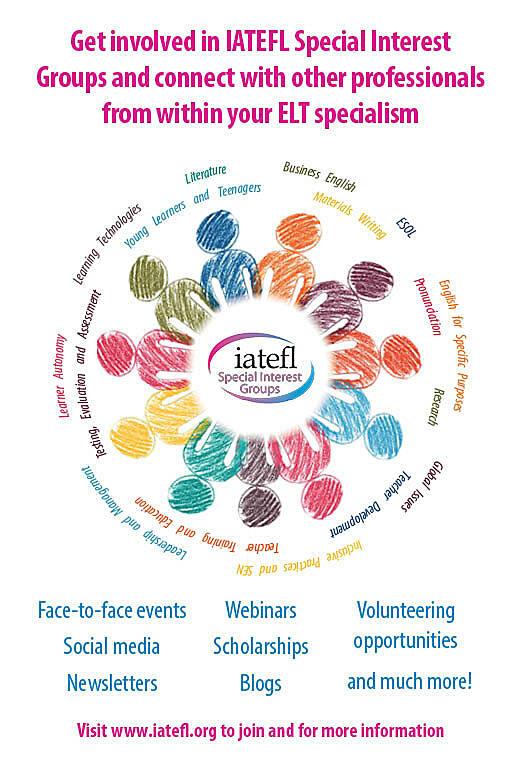
ISBN: 978-1-912588-37-4






























